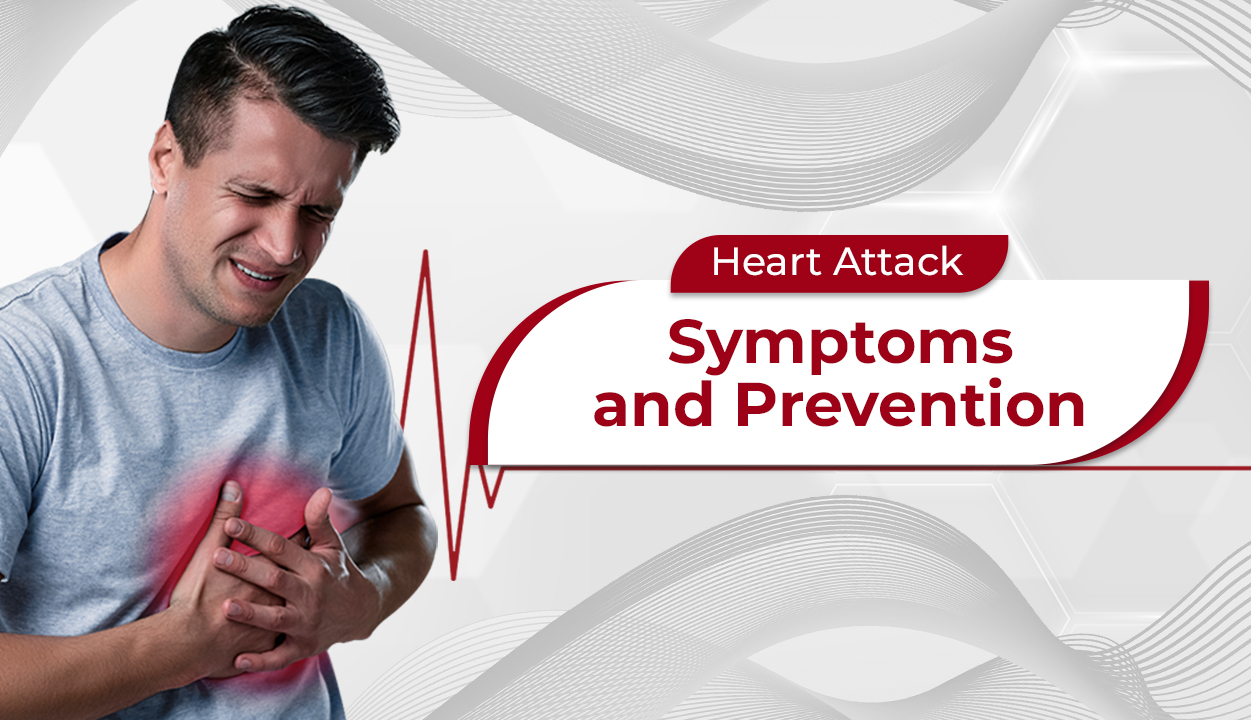
Heart Attack Symptoms and Prevention
Heart attacks are serious medical emergencies that can be life-threatening. It is important to understand what a heart attack is, its causes, risk factors, symptoms, and how to prevent it by maintaining a healthy heart.
A heart attack, a myocardial infarction, happens when a part of the heart doesn’t get enough blood because something is blocking it. This can lead severe chest pain to damage of heart tissue. It is typically caused by the formation of plaques in the coronary arteries, which may rupture and form clots, blocking blood flow.
The causes of a heart attack can vary, and understanding them is essential for recognizing risk factors and taking steps to protect yourself from any heart disease.
Causes of Heart Attack
- Coronary Artery Disease (CAD): The primary cause of heart attacks, CAD results from the gradual build-up of cholesterol-containing plaques in coronary arteries, restricting blood flow to the heart.
- Coronary Artery Spasm: Sudden, severe contractions of coronary arteries, even without significant blockage, can trigger a heart attack.
- Infections: Viral infections, particularly myocarditis, can damage the heart muscle over time, increasing the risk factor of a heart disease.
- Spontaneous Coronary Artery Dissection (SCAD): SCAD, though less common, occurs when a tear forms inside a coronary artery, disrupting blood flow and leading to a heart attack.
- Autoimmune Conditions: Certain autoimmune conditions, like rheumatoid arthritis or lupus, can cause arterial inflammation, elevating the risk factor of heart attacks.
These are significant and primary causes that provide insights into why a heart attack occurs in the first place, while the symptoms serve as crucial indicators for prompt medical attention. By connecting these dots, we can better grasp the complexity of heart disease and the importance of preventive measures for heart attack.
Symptoms of Heart Attack
Knowing the symptoms of a heart attack is essential as it can be a life-saving factor. Here’s a more detailed explanation of common symptoms:
- Chest Pain or Discomfort: This is often the hallmark symptom of a heart attack. It may feel like heavy pressure, tightness, pain, squeezing, or aching in the chest area.
- Radiating Pain: Chest Pain or discomfort can extend, typically moving to the shoulder, left arm, back, neck, jaw, teeth, or upper belly.
- Cold Sweat: Experiencing cold sweats, often accompanied by clammy skin, is a sign of a heart attack.
- Fatigue: Sudden and unexplained fatigue, especially severe and unrelated to physical exertion or lack of sleep, could indicate a heart attack.
- Heartburn or Indigestion: Heart attack symptoms can sometimes be confused with indigestion or heartburn. And should not be ignored when they occur in conjunction with other heart attack signs.
- Light headedness or Dizziness: It can be related to the heart’s reduced ability to pump blood effectively.
- Nausea: Nausea, sometimes accompanied by vomiting, can occur during a heart attack, especially in women.
- Shortness of Breath: Difficulty breathing, with tightness giving chest pain, is a significant symptom.
- Atypical Symptoms for Women: Women may experience atypical heart attack symptoms, including neck, arm, or back pain and chest pain.
By adopting a heart-healthy lifestyle and addressing risk factors, we can take proactive steps as prevention and safeguard ourselves from any heart disease. Let’s learn about these preventive measures to ensure a healthier, heart-smart future.
Prevention of Heart Attack
Reducing the risk factors of a heart attack involves various lifestyle changes and preventive measures:
- Quit Smoking: This is one of the most impactful steps to protect your heart.
- Manage Stress: Techniques such as mindfulness, relaxation exercises, or therapy can help manage stress effectively.
- Control Diabetes: For individuals with diabetes or prediabetes, managing blood sugar levels is essential to reduce the risk factor for heart attacks.
- Adopt a Heart-Healthy Diet: A diet low in trans fats and saturated fats while rich in fruits, vegetables, whole grains, lean proteins, nuts, and seeds can promote heart health.
- Limit Alcohol Consumption: Excessive drinking can alleviate the risk factor for heart disease.
- Address Sleep Apnea: Seeking treatment and improving sleep quality is crucial for heart health.
- Regularly Monitor Cholesterol Levels: Monitor cholesterol levels and keep a check on regular intervals.
- Stay Physically Active: At least 100-150 minutes of moderate-intensity weekly exercise can help maintain cardiovascular health.
These step can significantly reduce your risk factor of experiencing a heart attack and contribute to overall heart health. Remember, early intervention and prevention measures greatly improves outcomes of heart well-being.
If you seek expert care, we recommend consulting our heart specialists at Yashoda Super Speciality Hospital. You can book your appointment by clicking on this link. http://182.9.136.75:62/7
